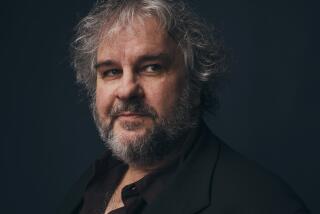‘A Hard Day’s Night’ Still Feels All Right
- Share via
To see “A Hard Day’s Night” again after more than 35 years reinforces the notion that although audiences have dated and aged, the Beatles, at least on film, are forever young.
In fact, this 1964 Richard Lester-directed picture, now re-released with a digitally restored soundtrack, does for older audiences what J.K. Rowling’s Harry Potter series does for mature readers: It enables us to recapture exactly the delightful sensations felt all those years ago when we and the world were young and exciting together.
From the opening chords of the title song played over the group bemusedly fleeing from their fans, “A Hard Day’s Night” creates pure, infectious joy. Larking about is what these Beatles do best, pleasure is what they convey, and no amount of on-screen orders to “stop messing about” and “try to act with a bit of decorum” can change that.
According to recent obituaries of its producer, Walter Shenson, the fact that this Beatles classic exists at all is something of a fluke. United Artists had discovered that the group’s recording contract did not cover soundtracks, and a quickie film was ordered up to take advantage of what was perceived as the group’s very limited time in the sun. As if.
Featuring an irresistible medley that includes love-struck songs like “She Loves You,” “All My Loving,” “And I Love Her” and “Can’t Buy Me Love,” “A Hard Day’s Night” was in theaters three months after its first day of shooting. But despite, or maybe because of, this haste, everything came together beautifully, an almost miraculous confluence of factors resulting in what New York’s Village Voice accurately called “the ‘Citizen Kane’ of jukebox movies.”
The key player here was expatriate American director Richard Lester. His previous effort, the wonderfully titled “The Running, Jumping and Standing Still Film,” neatly encapsulated the approach he would bring to “A Hard Day’s Night,” a style that used hand-held camera work, quick cutting, offhanded verbal retorts as well as visual comic techniques pioneered by the kings of silent comedy.
*
The Beatles, as it turned out, suited this style perfectly. Young and lithe, with natural screen presences, they delighted in mugging, vamping and quipping. And they were so handsome and, by modern standards, so clean-cut, it’s difficult to remember how controversial they were. The face of teen rebellion certainly has changed, and if a time comes when audiences regard Limp Bizkit with a fond nostalgia for the bygone innocence they represent, that will be a strange day indeed.
“A Hard Day’s Night” is also helped by the more than serviceable plot concocted by Oscar-nominated screenwriter Alun Owen, which revolved around the twin poles of the group’s desire to have fun and the need to keep an eye on Paul’s troublemaking grandfather (Wilfrid Brambell, only 52 at the time), capable of creating dissension in a New York minute.
*
Owen, who spent time with the group before writing the script, also engaged in an artful bit of myth making, creating a pop iconography for the Beatles that has lasted to this day. Here we see, in embryo form, John as the clever imp, Paul as the romantic, George as the mysterious presence and Ringo as the man who gets no respect.
“A Hard Day’s Night” is also skillful in how it makes us complicit in the group’s appeal. By the time the screaming hordes go wild at the live TV performance that closes the film, we’ve been made to feel that we are closer to the Beatles and know them better than mere screamers ever could. It’s a total illusion but no less satisfying for that.
Then there is the Beatles’ music, an elixir as potent as any in myth or legend. We wanted it never to end, but it did. John was murdered, George nearly met the same fate, Paul’s wife died young, and so on. Yet while “A Hard Day’s Night” brings that all to mind, it also reminds us that in some very tangible and satisfying ways, that music never did die and likely never will.
Exclusively at the Nuart, 11272 Santa Monica Blvd., (310) 478-6379.
More to Read
Only good movies
Get the Indie Focus newsletter, Mark Olsen's weekly guide to the world of cinema.
You may occasionally receive promotional content from the Los Angeles Times.











